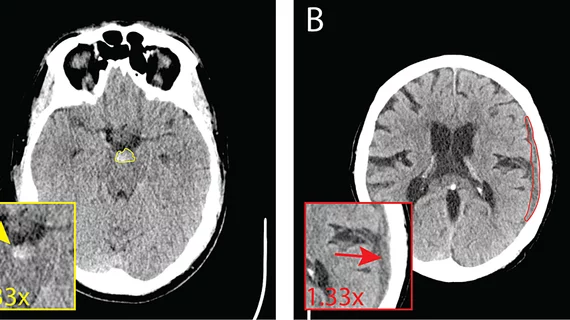AI system boosts intracranial hemorrhage detection
Improving the detection of intracranial hemorrhage (ICH) on CT scans has been somewhat of an Achilles heel for artificial intelligence tools, but the authors of a new study believe they may have found the golden ticket with a deep learning system that does indeed boost the detection of ICH.
The system is Caire ICH, and in an analysis that included more than 500 CT scans, its use improved radiologist performance across a number of metrics.
“Though algorithms have been constructed to evaluate scans for the presence of an ICH, they treat ICH as a homogenous pathology, when in fact various subtypes of ICH are observed and often managed in differing ways,” corresponding author of the study Gabriel Neves, MD, of the Texas Tech University Health Sciences Center, and colleagues explained.
Specifically, the system improved inter-reader agreement by an average of 5.76% in a dataset with an ICH prevalence of 74.3%. Accuracy, sensitivity and specificity all increased by 6.15, 4.6 and 10.62%, respectively. Compared to interpretations completed without the use of the system, radiologists were said to detect an additional 18 ICHs on average, while also improving their identification of different ICH subtypes when the tool was utilized
The authors noted that in a reading environment that is subject to increasingly burdensome workloads for radiologists, the likelihood of interpretation errors and missed findings increases. This is especially true in the instances of ICH, which can be deadly for patients. Having tools available to enhance detection is beneficial for all involved, they suggested.
“This study implies that future clinical workflows may see AI be used in an adjunct capacity to improve interpretations of CT scans by helping call radiologists' attention to findings that may be overlooked.”
The detailed study can be viewed in Cureus.

